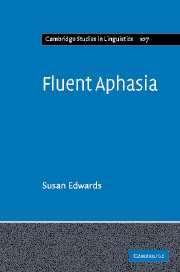Book contents
- Frontmatter
- Contents
- List of figures
- List of tables
- Acknowledgements
- Introduction
- 1 Fluent aphasia: identification and classic descriptions
- 2 Descriptions of fluent aphasia
- 3 Assessment and fluent aphasia
- 4 Connected fluent aphasic speech
- 5 Non-fluent and fluent aphasic speakers. What are the differences?
- 6 Comprehension and processing problems in fluent aphasia
- 7 The manifestation of fluent aphasia in one speaker
- 8 Some concluding thoughts
- References
- Index
8 - Some concluding thoughts
Published online by Cambridge University Press: 22 September 2009
- Frontmatter
- Contents
- List of figures
- List of tables
- Acknowledgements
- Introduction
- 1 Fluent aphasia: identification and classic descriptions
- 2 Descriptions of fluent aphasia
- 3 Assessment and fluent aphasia
- 4 Connected fluent aphasic speech
- 5 Non-fluent and fluent aphasic speakers. What are the differences?
- 6 Comprehension and processing problems in fluent aphasia
- 7 The manifestation of fluent aphasia in one speaker
- 8 Some concluding thoughts
- References
- Index
Summary
In the preceding chapters of this monograph, I have described fluent aphasia from various perspectives, trying to keep a balance between the clinician's view and the researcher's. Many researchers only ever meet people with aphasia within their research laboratories or have only paper encounters, relying on written transcripts or test results. I hope this text provides an impression of how aphasia impacts upon a person and a flavour of what it is like to talk with someone who has aphasia. In order to achieve this, I have drawn heavily on data collected from of one individual, MG, who has been aphasic for about ten years. Data collected from the years following his cerebral vascular accident (CVA) have been used to exemplify classical Wernicke's aphasia and, although his aphasia has diminished, he, like many other people with aphasia, has persisting language deficits. We have examined data comprising monologic connected speech, conversational speech, picture descriptions and responses to sentence and single-word tasks. In addition, data from other people with fluent aphasia, including test results, have been used to illustrate aspects of fluent aphasia. I hope they give some insight into the difficulties speakers with fluent aphasia face every day as well as illuminating the nature of this language disorder.
However, in order to gain a better understanding of this most complex disorder, we need to go beyond what we can hear and observe in daily contact or clinical tasks, and thus we have also discussed some seminal empirical work.
- Type
- Chapter
- Information
- Fluent Aphasia , pp. 203 - 213Publisher: Cambridge University PressPrint publication year: 2005



